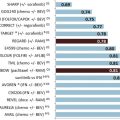Gastric malignancies are a leading cause of cancer-related death worldwide. At least 2 microbial species are currently linked to carcinogenesis and the development of cancer within the human stomach. These include the bacterium Helicobacter pylori and the Epstein-Barr virus. In recent years, there has been increasing evidence that within the human gastrointestinal tract it is not only pathogenic microbes that impact human health but also the corresponding autochthonous microbial communities. This article reviews the gastrointestinal microbiome as it relates primarily to mechanisms of disease and carcinogenesis within the upper gastrointestinal tract.
Key points
- •
Gastric cancer is the fourth leading cause of cancer-related deaths worldwide, most commonly caused by chronic infection with intracellular bacterium Helicobacter pylori.
- •
H pylori is the most common cause of peptic ulcer disease. The drivers that determine malignant transformation over self-limiting ulcer and chronic gastritis remain unknown.
- •
In addition to H pylori , the stomach hosts a diverse and active microbial community whose role in host response and pathogenesis has yet to be fully delineated.
- •
The gastric microbiome is likely a marker of host health and influences the inflammatory response within upper gastrointestinal cancers.
Stay updated, free articles. Join our Telegram channel

Full access? Get Clinical Tree





